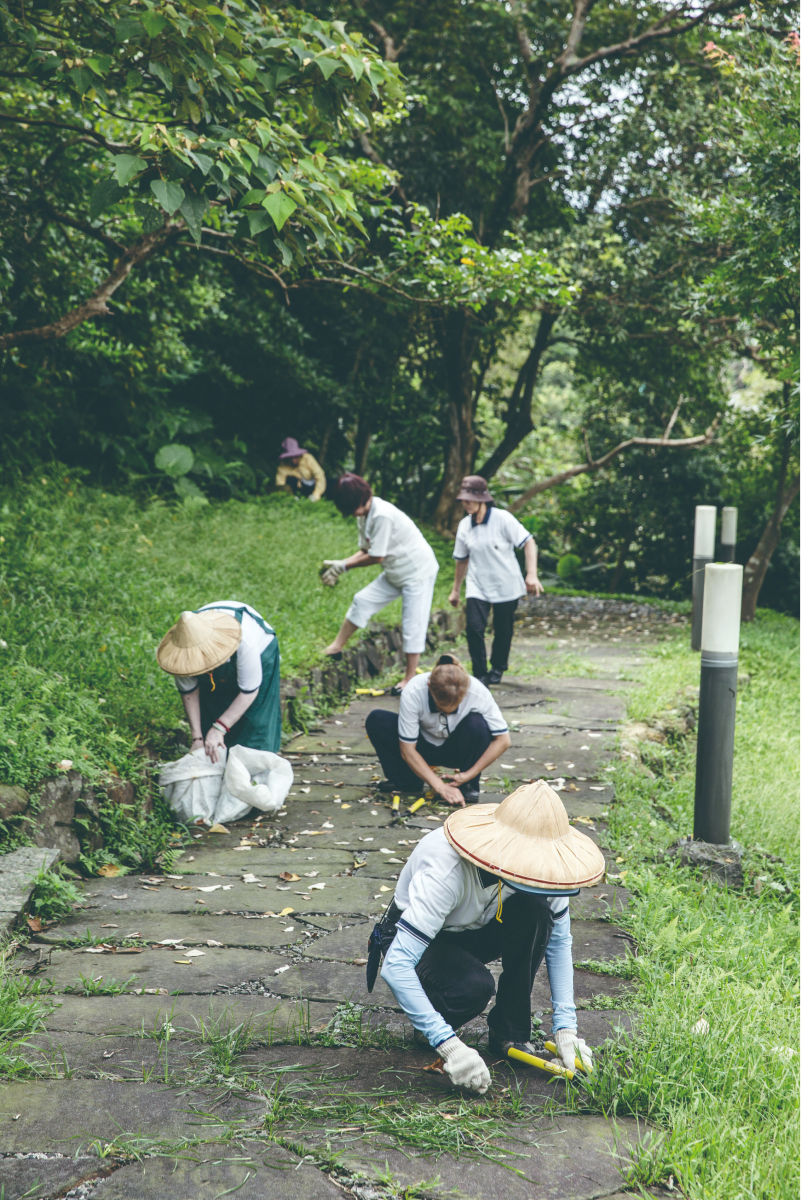Special Topics
Buddhist Scripture of Filial Piety: Ksitigarbha Sutra
In Chinese folk religion, the seventh lunar month is known as the Ghost Month. During this period, people customarily prepare various kinds of food and drink as offerings for wandering ghosts, in the hopes of keeping evil at bay. However, there is no such concept of a "ghost month" in Buddhism. Instead, the seventh lunar month is referred to as the "filial piety month", which signifies gratitude for and reminiscence of parents and ancestors. During this month, Buddhist monasteries usually hold Ksitigarbha Dharma Services to celebrate filial piety and to expand the kind intention of rescuing deceased family members into the compassionate mind of delivering all the suffering sentient beings. The scripture chanted for the Ksitigarbha Dharma Assembly is the Ksitigarbha Bodhisattva Purvapraṇidhana Sutra ("Ksitigarbha Sutra" for short), which is regarded as the "Buddhist scripture of filial piety." The Ksitigarbha Sutra is an important Buddhist scripture which relates how, prior to reaching nirvana, the Buddha repaid his mother's kindness by ascending to the Trayastriṃsa Heaven to give a Dharma talk to his mother.It includes depiction of Ksitigarbha Bodhisattva's past lives as a Brahmin girl and a bright-eyed girl respectively, vowing to deliver all the suffering beings for the sake of rescuing their mothers in the unfortunate destinies of existence. Her filial piety further developed into the great vow which states: "Only when all sentient beings are delivered, will I attain Bodhi; if the hells are not empty yet, I will not attain Buddhahood." Such profound filial piety and great aspiration of "prioritizing the deliverance of others over that of self" was deemed by Elderly Ven. Chuk Mor as the principle model for Mahayana practitioners.
The Ksitigarbha Sutra is an important Buddhist scripture which relates how, prior to reaching nirvana, the Buddha repaid his mother's kindness by ascending to the Trayastriṃsa Heaven to give a Dharma talk to his mother.It includes depiction of Ksitigarbha Bodhisattva's past lives as a Brahmin girl and a bright-eyed girl respectively, vowing to deliver all the suffering beings for the sake of rescuing their mothers in the unfortunate destinies of existence. Her filial piety further developed into the great vow which states: "Only when all sentient beings are delivered, will I attain Bodhi; if the hells are not empty yet, I will not attain Buddhahood." Such profound filial piety and great aspiration of "prioritizing the deliverance of others over that of self" was deemed by Elderly Ven. Chuk Mor as the principle model for Mahayana practitioners.The concepts of karmic causality and merit transfer as taught in the Ksitigarbha Sutra are not only suitable for the spiritual capacities of all sentient beings, but also resonate with the Confucian spirit of serving parents with filial piety as well as honoring one's ancestors. After its introduction to China, the sutra became widespread among the general public, and has since been greatly promoted by eminent monks throughout history. For example, Master Hong Yi of the early twentieth century not only wrote a commentary on the sutra to promote it, but also recited it on his mother's death anniversary, his own birthday, as well as the Tomb-Sweeping Festival to transfer the merit to his mother, thereby wishing her to leave suffering behind and attain happiness.
Like Master Hong Yi, many Buddhists come into contact with the Ksitigarbha Sutra due to the death or illness of their relatives and friends. "Thanks to the Ksitigarbha Sutra that has helped me through the hard times." said the Taiwanese vocalist Zhang Xingyue, who started to recite the Ksitigarbha Sutra as her mother was diagnosed as having cancer. At first, her friends advised her not to recite the Ksitigarbha Sutra without a particular reason, making her think that it was a scripture specifically on hells and the King of Mara (Yamarāja). But after reading it, she realized that this was a complete misconception, and found that the sutra has the most profound teachings on filial piety as well as the Buddhist concepts of causality and karmic retribution.
As Master Dao Yuan indicated in his Commentary on Ksitigarbha Bodhisattva Pūrvapraṇidhāna Sutra, ordinary people wrongly think the Ksitigarbha Sutra to be dealing solely with the law of causality and karmic retribution, as well as the names of hells in plain words, without involving particularly sophisticated or new theories. Therefore, they tend to neglect its importance, seeing it as a scripture only about delivering the souls of the deceased, and gaining benefits for one's present life.
The immense mental capacity Buddhists should develop
 "This was the first mistake I made." said the director of Chan Meditation Center, Ven. Chang Hwa, who used to give Dharma talks at Earth Treasure (Ksitigarbha) Bodhisattva Hall during the Great Compassion Water and Land Dharma Service. The Venerable confessed that, despite having recited the Ksitigarbha Sutra for hundreds of times, she was doing so with an exchange mindset, exclusively seeking after merit. Later, after delving into the essence of the sutra inspired by Dharma talks, she came to understand that one cannot actually fulfill the practice of the Bodhisattva path without studying the Ksitigarbha Sutra.
"This was the first mistake I made." said the director of Chan Meditation Center, Ven. Chang Hwa, who used to give Dharma talks at Earth Treasure (Ksitigarbha) Bodhisattva Hall during the Great Compassion Water and Land Dharma Service. The Venerable confessed that, despite having recited the Ksitigarbha Sutra for hundreds of times, she was doing so with an exchange mindset, exclusively seeking after merit. Later, after delving into the essence of the sutra inspired by Dharma talks, she came to understand that one cannot actually fulfill the practice of the Bodhisattva path without studying the Ksitigarbha Sutra.Ven. Chang Hwa explained that Ksitigarbha Bodhisattva has unhesitatingly shouldered the responsibility to deliver all sentient beings since innumerable kalpas ago, vowing to deliver all sentient beings before he attains Buddhahood. What Ksitigarbha Bodhisattva manifests is the very mental capacity Buddhists should develop. To put it even more straightforwardly, living in this world, we can achieve nothing without others' contributions." The Venerable urged everyone to enlarge their mental capacities by helping others at all times, aligning our mindset and behaviors with that of the Bodhisattva's.
As Ven. Chin Kung, founder of the Corporate Body of the Buddha Educational Foundation, shared in his work, "Insights of the Ksitigarbha Sutra", propagating the Buddhist teaching is just like building monasteries, which require strong foundations. Whenever he was invited to a new place to propagate the Dharma, he always began with explaining the Ksitigarbha Sutra, whose essence is about guiding us to start from cultivating our minds.
Uncovering our infinite inner treasure
For example, the Ksitigarbha Sutra contains depictions of various forms of suffering and distress, including birth, aging, sickness, and death; natural or man-made disasters; and, finally, wars and epidemics. These things may take place around us, or even happen to ourselves. Therefore, for all bodhisattva practitioners, the purpose of reciting the sutra is to cultivate compassion and loving-kindness for suffering beings rather than merely understanding the sutra's text in a superficial manner. In addition, reciting the sutra allows us to model ourselves on Ksitigarbha Bodhisattva, by seeking to observe, relate to, and even release the suffering of sentient beings.
"Start from putting ourselves in others' shoes," said former director of Zhaiming Monastery Ven. Guo Zhou, who shared how she did so by seeing things from others' viewpoints, with an awareness that ordinary people and beings are subject to their karma and tend to constantly create evil karma. If we have a tolerant mind towards others' speech and actions, then we can transform conflicts between self and others.
As the Sutra of Filial Piety states: "Even if we carry our father on the right shoulder and our mother on the left for over a thousand years, and let them excrete on our backs, there is no way we can possibly repay their kindness." So, how should we repay our parents' kindness? In addition to showing our filial piety, Master Sheng Yen encouraged people to make good use of our physical body that comes from our parents, as well as contribute our efforts to benefit the next generation, the society, and all beings.
Showing filial piety to parents, generating the Bodhi mind, firmly believing in the law of cause and effect, and cultivating the ten wholesome actions—these practices as listed in the Ksitigarbha Sutra are valued by all Buddhist schools and approaches. Thus, the Ksitigarbha Sutra serves just like the foundations of Buddhist practice. for each Buddhist to lay the basis for uplifting their life. Only when we delve into Ksitigarbha Bodhisattva's Dharma approach of the mind to alter our attitudes towards life, can we truly offer our blessings to all the sentient beings, thus transcending time and space.
Related articles:
Buddhist Scripture of Filial Piety: Ksitigarbha Sutra
A Basic Introduction to the Ksitigarbha Sutra
The Foundation of Attaining Buddhahood — Altruism
Practicing Ksitigarbha Bodhisattva's Method
Common Questions on the Practice of Ksitigarbha Sutra
Resource: Issue 372 of Humanity Magazine, Dharma Drum Publishing Corporation
Translation: Sinag-ling Li (李祥苓)
Editing: Keith Brown, Chia-Cheng Chang (張家誠)
